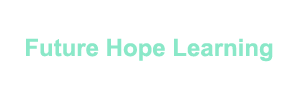
Is eLearning The Future of Education?
- Posted by: Future Hope Learning Admin on 06-02-2022 08:07 AM
Now education is available online
Technology has fundamentally altered the way education is provided. The classroom is no longer a physical site, and students can learn in an atmosphere that is familiar to them. Students' perspectives on education and their pursuit of degrees have shifted as a result of eLearning.
Nowadays, earning a degree or certificate online has grown more convenient. Students are typically able to learn at their own pace because they are no longer required to drive to a classroom. To access the classes and course materials, all students need is an internet connection.
Online education has grown in popularity rapidly as a result of its widespread accessibility and numerous benefits.

Students and employees can receive training virtually for almost anything
Many sectors, colleges, and businesses now accept online credentials and courses from individuals vying for positions based on their subject-matter expertise. As online degrees and certificates become more widely accepted, their popularity continues to grow.
You can study a variety of course kinds and acquire virtually any skill necessary to advance your profession through eLearning. You can train for almost anything as long as you have access to the internet. The variety of courses and disciplines available is extensive, with numerous alternatives available for every area of interest.
Five trends are reshaping education's future, allowing students and teachers to embrace technology.
The first is referred to as Learning Management Systems (LMS). This module is intended to assist in the development and tracking of a range of online training projects. Professors can utilize the LMS to submit things such as lectures to make them easily accessible to their students online.
Gamification is another educational trend. This approach generates algorithms for the development of instructional games accessible to students. This technology enables personalisation, interaction, and a more positive user experience.
Virtual Reality (VR) and Augmented Reality (AR) are the third educational trend (AR). In virtual reality, the environment is stimulated, whereas in augmented reality, information is superimposed on an existing world. Students can imitate real-world surroundings through the use of both VR and AR technology, allowing for greater hands-on learning.
Coding and robots are the fourth trend. Numerous educational institutions have begun to incorporate robotic technologies into the classroom. These organizations collaborate with instructors to help create a more conducive educational environment for children.
Finally, the emergence of the smart classroom is a trend. A smart classroom is a learning environment that has been designed with technology in mind. Students in smart classrooms can take advantage of cutting-edge technologies ranging from smart tablets and speech recognition to biometric devices, sensors, and artificial intelligence (AI).
What is eLearning
What Is eLearning? The foundation of eLearning is the ability for students to completely access a traditional classroom setting online. In many circumstances, eLearning refers to totally online degrees, programs, and certificates.
eLearning is available in a variety of forms, including electronic learning, learning via the Internet, remote education, electronic learning, and online learning. eLearning is a term that refers to courses that are disseminated via the internet to locations other than the classroom, but preserve a similar learning environment in which students can engage directly with educators.
In many circumstances, a course can be delivered live, with students able to communicate with one another in real time via "electronically" raising their hands. The teacher will continue to grade you, issue tests and homework, and award participation points, all while you learn in a more comfortable environment.
eLearning online resources cover everything from professional development to preparation for tests like the GMAT
Through eLearning, individuals can enhance and grow their professional abilities. eLearning provides a range of tools and courses that can be customized to meet an individual's needs.
eLearning may assist you in developing and growing your communication skills, collaborative abilities, digital knowledge, and autonomous experience, among other things.
There are an infinite number of courses available. Individuals can also study for the GMAT exam via online education.
eLearning has made it possible for individuals to develop their minds professionally from the comfort of their own homes.


